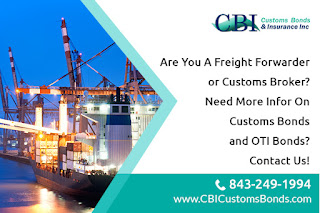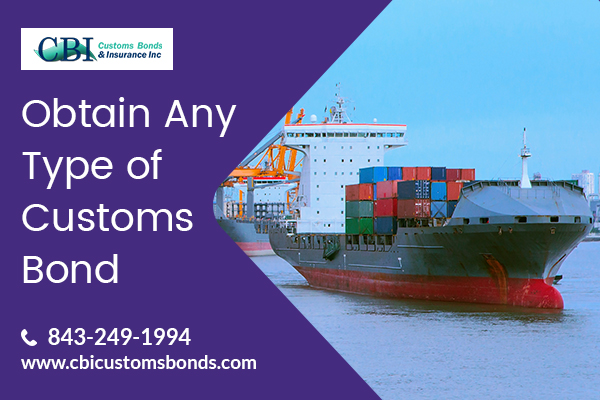Important Things to Know About Customs Bonds and OTI Bonds
If you ever stumbled upon customs bonds NY, you probably have read it somewhere in
trade-related articles or have heard it in transport discussions. Luckily, we
are going to break both the terms, “OTI Bonds CA” as well, and will discuss
here in this article how they work. Bonds are the prerequisite in the
international transportation industry and this means if you’re going to
import/export something or want to evolve in transportation as a freight
forwarder or carrier, you should be aware of basics about bonds.
There are different types of bonds that vary with the type of
activity you are going to conduct. If you’re a customs broker, you will need to
earn a license from the Customs and Border Protection (CBP). If you desire to
operate as a Non-Vessel Operating Common Carrier (NVOCC) you required by the
Federal Maritime Commission (FMC) to obtain a surety bond. You must be licensed
to operate as an Ocean Transportation Intermediary (OTI) to stay compliant with
rules and regulations.
Customs bonds CA are an important component when it comes to
importing goods from foreign countries to the United States. It’s like an
insurance policy that guarantees that the principal (importer) will obey all
the financial obligations and follow the laws and regulations during a
transaction. If the importer fails to adhere to pertaining rules or find with
insufficient bond, the CBP retains the right to make a claim against insurance,
delay the merchandise, or suspend the transaction.
There are mainly two types of bonds – continuous customs bond and a single entry bond. When the
shipment’s commercial value crosses the mark of $2,500, the importer needs to
post sufficient customs bonds NY. It is simply intended to protect the interest
of the US treasury. There are many other documents that a merchandiser needs to
fulfill.
You can submit a continuous customs bond if you’re required
to do shipment multiple times in a year. You can either post a single bond,
which is valid for a single transaction during the period of 12 months. You
need to renew a single entry bond every year and a continuous bond is 10% of
duties, taxes, and fees paid for the 12 month period and it gets renewed automatically.
OTI Bonds NY are
for IFFs and NVOCCs who have been in the international shipping business for at
least 3 years and want to operate as Ocean Transport Intermediaries. Similar to
other custom bonds, it is intended to ensure that Otis will follow the Ocean
Shipping Reform Act. It also allows the FMC to collect all duties, taxes, and
fines for the violation of regulations by an OTI.




Comments
Post a Comment